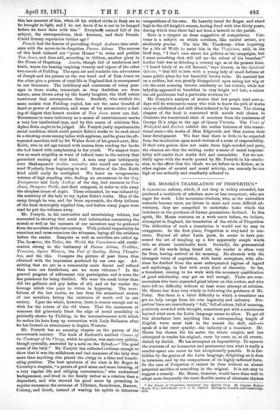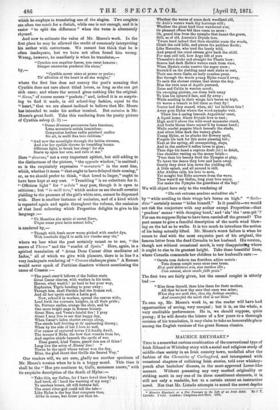MR. MOORE'S TRANSLATION OF PROPERTIUS.*
A CLASSICAL culture, which, if not deep is widely extended, has produced a multitude of scholars, more or less competent, who are eager for work. Like mountain-climbers, who, as the untrodden summits become rarer, are driven to more and more difficult ad- ventures, they are compelled to undertake tasks which the indolence or the prudence of former generations declined. In this spirit, Mr. Moore ventures on a work never before, we believe, attempted in England, the translation of the whole of Propertius. The difficulties of such a translation it would not be easy to exaggerate. In the first place, Propertius is very hard to con- strue. Beyond all other Latin poets, he seems to have pos- sessed the art of tangling up a few apparently simple words into an almost inextricable knot. Secondly, the grammatical sense of his words being found out, the reader is often very far from having arrived at his meaning. He abounds with the strangest turns of expression, with harsh metaphors, with allu- sions far-fetched from the most unfrequented regions of legend and mythology, in fact with every kind of obscurity. So far, a translator, coming to his work with the necessary qualification of good scholarship, may get on well enough. There are com- mentators who have expended great labour on this author, and who have left no difficulty without at least some attempt at solution. Mr. Moore has done very wisely in following the guidance of Mr. Paley. But there is a third difficulty in which a translator can get no help except from his own ingenuity and industry. Pro- perdue' lines are marvellously "full," full of colour, full of meaning, positively crowded with thought, sometimes put with a conciseness beyond what even the Latin language seems to allow. To get all this abundance into anything like a corresponding length of English verse must task to the utmost the skill, and—to speak of a far rarer quality—the industry of a translator. Mr. Moore has chosen for his metre the heroic couplet, and has attempted to render his original, verse by verse or, at all events, distich by distich. fle has attempted an impossibility. To squeeze the contents of an hexameter and pentameter into what is really a smaller space can never be but exceptionally possible. It is for- bidden by the genius of the Latin language, delighting as it does in terseness, and by the compactness of its highly inflected form. In the case of Propertius it cannot be done without an almost perpetual sacrifice of something in the original. It is not easy to suggest a remedy. Mr. Moore, however, would have done well to adopt more frequently the more flexible metre of alternate rhymes • The Elegies of Propertius. translated into English Verse. By Charles Robert Moore. M.A., late scholar of C. C. C., Oxford. Itivington, London and Cambridge. 1870.
which he employs in translating one of the elegies. Two couplets are often too much for a distich, while one is not enough, and it is easier "to split the difference" when the verse is alternately rhymed.
And now to estimate the value of Mr. Moore's work. In the first place be may be allowed the credit of commonly interpreting his author with correctness. We cannot but think that he is often inadequate, but we have not often found him wrong. Wrong, however, he manifestly is when he translates,—
"Cynthia non sequitur fasces, non curet honoree ; Semper amatorum ponderat ills sinus,"
"Cynthia never aims at power or praise ; Th' affection of tho heart is all she weighs,"
where the first line does not convey the poet's meaning that
Cynthia does not care about titled lovers, as long as she can get rich ones ; and where the second gives nothing like the original. "Sinus," of course means "pockets ;" and, indeed it is so surpris- ing to find it made, in old school-boy fashion, equal to the "heart," that we are almost inclined to believe that Mr. Moore has intended to make his author ironical. But omission is Mr.
Moore's great fault. Take this rendering from the pretty picture of Cynthia asleep (i. 3) :—
"Donee diversas permit-rens lane fenestras, Luna moraturis sedula luminibus
Composites levibus miffs patefecit °cellos Sic ait, in molli fixa toro cubitum."
"And now the moonlight through the lattice streams, And o'er her eyelids throws its trembling beams. Officious light, to break her sleep ! for she Starts up upon her arm, and rails at me."
Here "diversas," not a very important epithet, but still adding to the distinctness of the picture, "the opposite window," is omitted ; so is the exquisitely expressive "moraturis" in the next line, which, whether it mean "that ought to have delayed their coming,"
or, as we should prefer to think, "that loved to linger," ought to have been kept at any cost. " Trembling " is no substitute for it.
"Officious light" for " sedula " may pass, though it is open to criticism ; but "in molli toro," which makes us see the soft coverlet
yielding to the pressure of the girl's white arm, cannot be dispensed with. Here is another instance of omission, and of a kind which is repeated again and again throughout the volume, the omission of that local colouring which Propertius delights to give to his language :—
" Ut Maeotica nix minio si certet There, Utqne ruse puro lade natant Iona,"
is rendered by,—
" Though with fresh snow warm pinked with scarlet dye, With rosebuds dipp'd in milk her cheeks may vie," where we lose what the poet certainly meant us to see, "the snows of Thrace" and the "scarlet of Spain." Here, again, in a spirited translation of "Arms Deus Caesar dites meditatur ad Indos," all of which we give with pleasure, there is in line 9 a very inadequate rendering of " Crassos cladesque piste." A Roman would never speak of Parthian disasters without mentioning the name of Crassus
"-The pearl-starr'd billows of the Indian main Great Caner cleaves, with warfare in his train.
Heroes, what wealth ! no land to bar your way, Euphrates, Tigris bending to your sway ; Though late, shall Parthia feel the Roman rod, And all her spoils enrich a Latin god.
Now, school'd in warfare, spread the canvas wide, Lead forth the coursers, knights, in all their pride ; Go, Fortune smiles, avenge the slain, and be One more bright page in Roman history.
Great Mars, and Vesta's fateful fire ! I pray Grant I may live to see that happy day, When Cassar's laden chariot sweeps along, The steeds half fretting at th' applauding throng ; When by the side of her I love so well, Ocer names of captured towns I'll fondly dwell, The tronser'd Mede, the bow that wounds from far, And captive chiefs beneath the spoils of war. Then guard, kind Venus, guard this son of thins! Long live the scion of 2Eneas' line ! • Theirs be the spoil whose valour won the day,
Mine, the glad shout that thrills the Sacred Way."
Our readers will, we are sure, gladly see another specimen of Mr. Moore's version when he is in a happy mood. This time it shall be the "Hoc pro continuo te, Galle, monemus amore," with its exquisite description of the death of Hylas
"Take this, my Gallus, for I have loved thee long ; And heed, oh ! heed the warning of my song ! Ye careless lovers, oft will fortune fail, The cruel river-god could tell the tale— Like Hylas is the boy that conquers thee, Alike in name, but fairer yet than he. by,—
Whether the waves of some dark woodland rill, Or Anio's waters wash thy footsteps still ; Whether the giant land thou wanderest o'er, Or pleasant evers bid thee roam no more : Oh, guard him from the nymphs that haunt the grove, Still, as of old, Ausonia's Dryads love. 'T were hard indeed that thou shouldst roam the woods, Climb the cold hills, and pierce tbo pathless floods; Like Hercules, who trod the lonely wild, And prayed the cruel stream give back the child.
For men still tell, how Argo left of yore Thessalia's docks and straight for Phasis bore: Scarce had dark Helle's waters sunk from view, When Mysia's rocks receive the eager crew ; Stretch'd on the yielding sand each sinks to rest, Their sea-worn limbs on leafy couches prest.
But through the woods young Hylas roam'd away, To seek the choicer stream that shuns the day. Him the twin sons of Aquilo pursued, Zetes and Caliiis in wanton mood; On swooping pinions, see them both essay To kiss his upturn'd face, and fly away ; While nestling in their wings, he's borne on high,
Or waves a branch to foil them as they fly !
Scarce had they ceased, when, all! too luckless fate!
Away goes Hylas where the wood-nymphs wait.
There lies a spring beneath Arganthus' crest, A liquid home, where Dryads love to rest ; High arch'd above the wild-wood monarchs stand, And fruits bloom there unrear'd by human hand; While scarlet poppies blush beneath the shade, And silver lilies deck the watery glade.
Young Hylas, as he plucks the flowery spoil, Forgets his task for this more pleasing toil ; Next at the spring, all unsuspecting, stays, And in the mellow'd reflex loves to gaze;
Then dips his hand a copious draft (sic) to drink,
One shoulder resting on the mossy brink- 'Twas then his beauty fired the Nymphs at play, To leave the dance they love and haste away.
Gently they draw him down the yielding rill, A little splash, and all around is still.
Afar Abides calls, his love to save, Yet nought but Echo answers from the wave.
Thus warn'd my Gallus, long your love enjoy, Nor make the Nymphs the guardians of the boy.'
We will object here only to the rendering of "Ills sub extrema pendens secluditur ala"
by "while nestling in their wings he's borne on high." "Seclu- ditur" certainly means "hides himself." Is it possible—we would not risk the conjecture with any author except Propertius—that pendens ' means 'with drooping head,' and 'ala' the ' arm-pit '?' For can we suppose Hylas to have been carried off the ground? The poet means to give a fanciful description of the north wind blow- ing on the lad as he walks. It is too much to introduce the notion of his being actually lifted. Mr. Moore's worst failure is when he comes to deal with the most exquisite part of his original, the famous letter from the dead Cornelia to her husband. His version, though not without occasional merit, is very disappointilag where it ought to rise to its greatest height. Take these beautiful lines,. where Cornelia commends her children to her husband's care :—
Oscula cum dederis tua flentibus, adjice matris :
Tota dooms coepit nunc onus ease tuum. Et si quid doliturus ens, sine testibus illis ; Cuss venient, siccis oscula falle penis."
The first two are fairly given, but the second couplet is utterly bad :—
"Kiss them thyself, then kiss them for their mother, All that be now thy care that once was mine ; When they are with thee, then th,y feelings smother, And counterfeit the mirth that is not thine."
To sum up, Mr. Moore's work is, as the reader will have had opportunities of seeing, very unequal ; but it is, on the whole, a. very creditable performance. He is, we should suppose, quite young ; if he will devote the leisure of a few years to a thorough revision of his translation, it may claim to take an honourable place among the English versions of the great Roman classics.



































 Previous page
Previous page